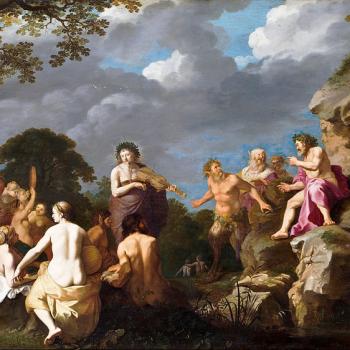“The first festival of the new year is the sacred marriage, Θεογαμίων, of Zeus and Hera. We give thanks to the Gods and to the person or people essential for our wellbeing. The virtues of Boldness and Pride are cultivated.”
Calendars and festival dates can be a source of argument in contemporary practice. Because I like simplicity, following the principle of necessity when matters requiring rectification arise helps a lot. Necessity requires us to make judgments appropriate for our circumstances in harmony with tradition. This is why I follow along with the official calendar of Y.S.E.E as it does not disrupt the solar system that is familiar to many. Following a lunar calendar is always an option, but is not mandatory. Ancient calendars differed depending on location, as the Greek tradition is expressed through localization. The manner in which calendars were constructed was in a pan-Hellenic way; each month marked one cycle of the moon and the months were named after the Gods or festivals.

Little changes to calendars can prompt us to some reflection as in the case of the first festival of the year, Theogamia. January corresponds to Γαμηλιών (Gamelion) making it the first month of the new year. The month is sacred to Hera, making Her the first to be honored in the new year with the festival of Θεογαμίων (Theogamia), celebrating the scared marriage of Hera to Zeus.
What meaning can be found in viewing the Theogamia occurring in the first month of the new year? On a basic level, the Theogamia, recognizes a physical phenomenon, the union of sky father (water) with earth mother (earth) that results in life. In imitation of the sacred marriage, many Athenians decided to get married during this month. Today the sacred marriage after the new year, a time that is seen as a ‘fresh start’ often accompanied by resolutions. Instead of the literal Athenian weddings, our resolutions, in light of the Theogamia, are commitments we make to ourselves (and or others). Resolutions often are for our benefit; goals to help improve ourselves or people around us.
While for the ancients, the meaning and application of the festival was heteronormative; today we can reexamine the festival and give to it a universal meaning. For everyone, this festival reminds us of what is essential in our lives, as the Orphic Hymn to Hera says “life does not exist without you, growth does not exist without you.” Hera is essential for Zeus and vice versa. It is essential for each person to acknowledge the Gods’ fundamental role in our lives as well as the person or people whom we view as essential for our wellbeing and nourishment. We give thanks to the Gods and to the person or people which we cannot live without.
Additionally, each month two virtues are cultivated. In January the virtues are Boldness/Frankness (Παρρησία) and Pride (Υπερηφάνεια). Plutarch, in Moralia, says that “frankness [παρρησία] is friendly and noble…[f]or this reason those who speak frankly are respected and admired.” We are to begin the new year with honest speech that is “friendly and noble.” Pride (Υπερηφάνεια) is the recognition of your self-worth and positive feelings towards accomplishments. At the new year it is good to look back at what you have done over the previous year, find things to be prideful about which you accomplished and give thanks to the Gods for those blessings.

















